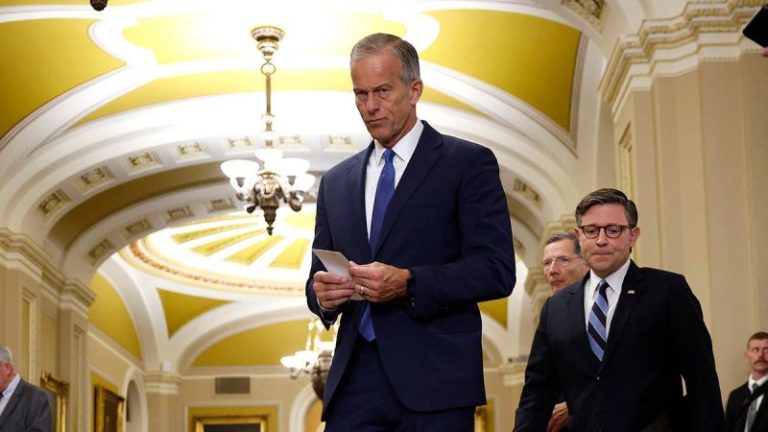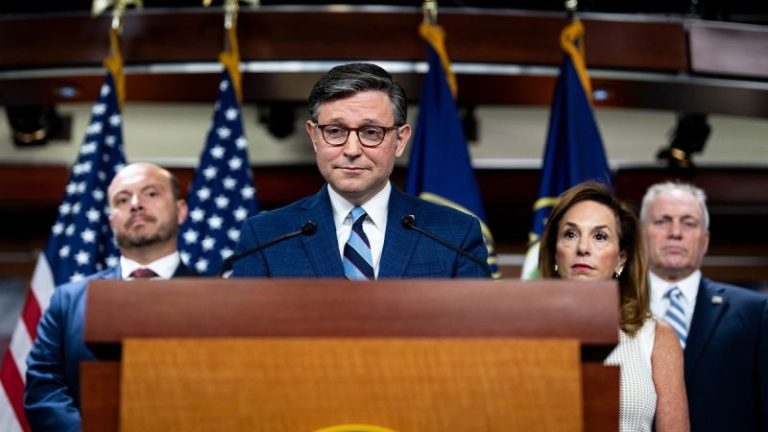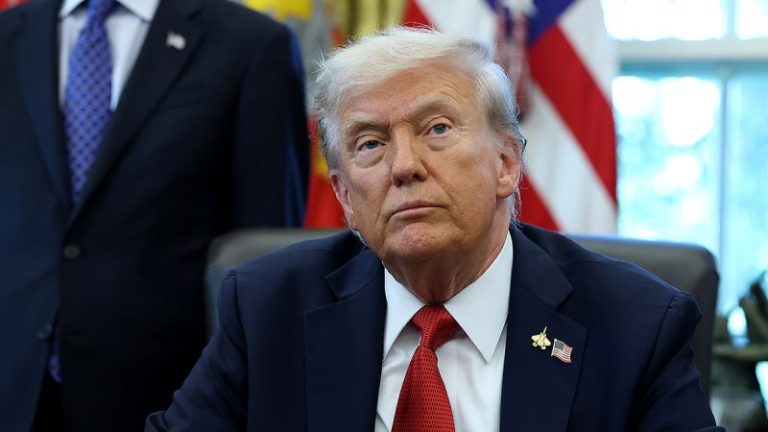House Republicans in battleground districts appear to be closing ranks as GOP leaders dig in on their government shutdown strategy, while the fiscal standoff shows no signs of slowing.
Eight House GOP lawmakers whose seats are being targeted by Democrats in 2026 spoke with Fox News Digital this week. And while some shared individual concerns, they were largely united in agreeing with Speaker Mike Johnson, R-La., that Republicans should not renegotiate their federal funding proposal — and were confident that Americans are behind them.
‘The more people understand the math inside of the Senate, the more I would say Republicans are winning,’ said Rep. Rob Bresnahan, R-Pa., who defeated a moderate Democrat for his seat last year.
Rep. Jen Kiggans, R-Va., who also flipped her seat from blue to red, argued the results of the 2024 election show Americans ‘can see through a lot of the games that the Democrats have been playing.’
‘We’ve gotten to work with the demands of the American voters, and Democrats are still in disarray,’ she said.
Rep. Derrick Van Orden, R-Wis., said, ‘It’s a simple math problem. And the Democrat Party grossly underestimated the American public’s ability to understand math.’
For a House GOP conference that’s been plagued by historic levels of division in recent history — particularly over the issue of government funding — it has shown a notable display of unity amid the shutdown, with few exceptions.
The shutdown is poised to roll into next week after most Senate Democrats voted to block the GOP’s bill for a tenth time.
Republicans put forward last month a seven-week extension of fiscal year (FY) 2025 funding levels, called a continuing resolution (CR), aimed at giving congressional negotiators more time to strike a long-term deal for FY2026.
But Democrats in the House and Senate were infuriated by being sidelined in those talks. The majority of Democrats are refusing to accept any deal that does not include serious healthcare concessions, at least extending COVID-19 pandemic-era Obamacare subsidies that are set to expire at the end of this year.
Several vulnerable Republicans who spoke with Fox News Digital pointed out they’re in favor of extending the Obamacare subsidies as well. Indeed, a majority of them are backers of a bipartisan bill to extend them for one year, led by Kiggans.
‘I think we would actually prefer to have … longer term than one year,’ said Rep. Ryan Mackenzie, R-Pa.
But Mackenzie also pointed out that House Minority Leader Hakeem Jeffries, D-N.Y., criticized the one-year bill, adding, ‘He already said ‘Absolutely not,’ so I don’t even know what their position is and what they’re asking for.’
Jeffries walked those comments back somewhat a day later, telling reporters that Democrats were willing to look at any good-faith offer.
Kiggans told Fox News Digital, ‘I care about that issue, certainly, you know, I had introduced that [Affordable Care Act] premium tax cuts extension.’
She added that Obamacare, formally called the ACA, and reopening the government are ‘two different issues, though’ that should be discussed separately.
The House Republicans who spoke with Fox News Digital, while largely supportive of discussing Obamacare subsidy reforms and extensions, were united in refusing to entertain Democrats’ demands to come back to the negotiating table on federal funding. All maintained, in some form, that the House did its job in passing the CR on Sept. 19.
‘We have a clean CR that would fund all of the programs — all of the federal employees, keep everything up and running through Nov. 21st, so that we can finalize FY2026 appropriations and address issues like healthcare. But you don’t do it at the barrel of a gun,’ said Rep. Mike Lawler, R-N.Y.
Lawler is one of three House Republicans who won in a district that President Donald Trump lost in 2024.
‘I think what the Democrats are doing here is creating a mess for the American people. And they’re not actually solving any of the problems,’ he said.
Mackenzie said, ‘It was a seven-week continuing resolution so that we could have time to have policy discussions on other issues that did need to be wrapped up by the end of the year. And we were on track to do that. And I think [Democrats] totally blew that process up.’
‘This is an unprecedented thing that Senate Democrats are doing, trying to add policy programs into the new continuity of funding bill,’ Rep. Tom Kean, R-N.J., the most vulnerable Republican in the Garden State, also said.
Both Lawler and Rep. Dave Valadao, R-Calif., warned that giving up a policy rider-free spending bill in favor of inserting partisan demands would create an unworkable new standard.
‘Holding the government office is never a good strategy. And if it becomes a successful way of negotiating … it’ll set a bad precedent for governing moving forward,’ Valadao said. ‘So this is an absolute no-go, should never be successful.’
Lawler said, ‘The reality is, the moment you start giving in on a clean CR and start giving in to demands, this will continue in perpetuity. Every time there’s a government funding lapse, you’ll have a group of people demanding something, and it will turn into a fiasco.’
Several of the battleground Republicans also praised Johnson and Senate Majority Leader John Thune, R-S.D., in the process.
Valadao told Fox News Digital, ‘I think they’re doing a good job. At least all the calls I’ve been on, the conversations I’ve had with my colleagues and, again, folks in the district, they all seem pretty confident that we’re doing the right thing.’
Lawler said Johnson had ‘handled it well,’ while Bresnahan said, ‘I would say, at least with members, they’re, you know, keeping very fluid conversations. We have daily or at least biweekly calls here as to what the messaging needs to be and what the conversations are.’
But there has been some dissent within the House GOP as the shutdown drags on.
Rep. Marjorie Taylor Greene, R-Ga., has criticized House Republican leaders for not announcing a plan on extending the Obamacare subsidies.
And Rep. Kevin Kiley, R-Calif., publicly ripped Johnson’s decision to keep the House out of session while the Senate considers the CR.
‘It is absolutely unacceptable to me and I think only serves further distrust,’ Kiley told MSNBC on Wednesday.
Notably, not all battleground House Republicans who spoke with Fox News Digital directly backed Johnson’s move — but none explicitly condemned it, either, and most blamed Senate Democrats for the holdup.
‘I’m kind of torn on that, because to come back and just be a part of the gimmicks that you see going on right now is not helpful,’ Valadao said. ‘Holding the government hostage is what’s the problem here.’
Kiggans, who said she’s lobbying for the House to vote on a standalone bill to pay both active duty and civilian members of the military, said, ‘I think we all want to get back to work. We know that we have work to do, but the ball’s in the court of the Senate Democrats and Chuck Schumer.’
Others more directly backed the move, however.
Kean told Fox News Digital that his staff were still busy in D.C. and in New Jersey trying to help constituents navigate the shutdown and other matters.
‘Any chance we can get back to our district, it’s always important that we listen to our constituents and hear their concerns,’ Kean said. ‘Right now, I 100% support the decision.’
Rep. Zach Nunn, R-Iowa, said it was ‘the right move.’
‘We should be with our district. I’m keeping all my district offices open despite nobody getting paid,’ Nunn said. ‘Coming back and having a theatrical debate is less effective than having a real conversation about how to get the government back open.’
This post appeared first on FOX NEWS










